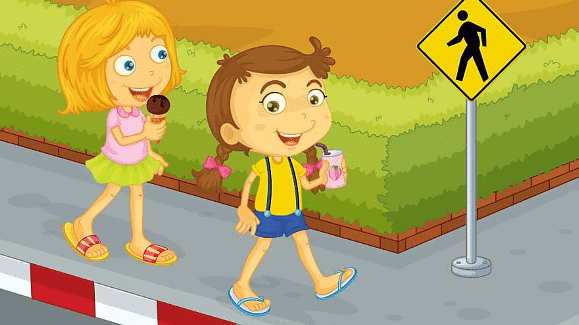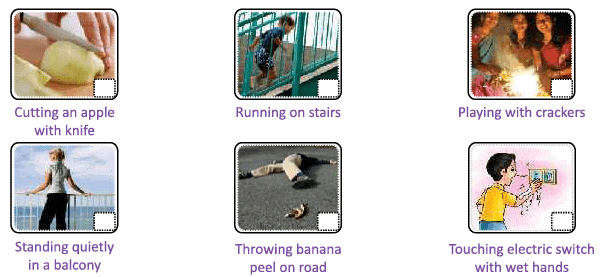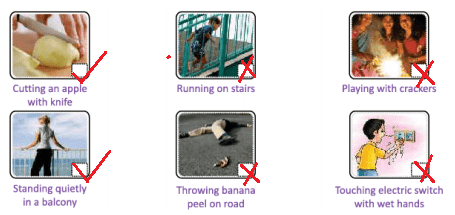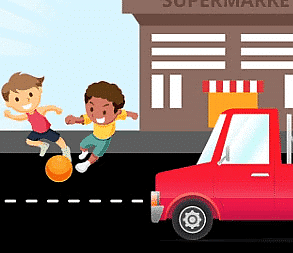Being Safe - 1 Class 1 Worksheet Science
Q1: Fill in the blanks using the words given in the box below.
(Lean, zebra, safety, play, swimming)
(i) _____ habits save us from accidents.
(ii) Never _____ on the road.
(iii) Use _____ crossing to cross the road.
(iv) Never _____ out of a moving bus.
(v) Never go for _____ alone.
Ans:
(i) Safety habits save us from accidents.
(ii) Never play on the road.
(iii) Use zebra crossing to cross the road.
(iv) Never lean out of a moving bus.
(v) Never go for swimming alone.
Edurev Tips:
- Safety habits save us from accidents.
- We should never play on the road.
- We should use zebra crossing while crossing the road.
- We should never lean out of a moving bus.
- We should never go for swimming alone.
Q2: Write T for true and 'F' for false statements.
(i) We should not obey traffic rules.
(ii) We should board a moving bus.
(iii) We should not go for swimming alone.
(iv) We should play on an open terrace.
(v) We should use a footpath to walk.
Ans:
(i) We should not obey traffic rules. False
(ii) We should board a moving bus. False
(iii) We should not go for swimming alone. True
(iv) We should play on an open terrace. False
(v) We should use a footpath to walk. True

Edurev Tips:
- We should always obey traffic rules.
- We should never board a moving bus.
- We should not go for swimming alone.
- We should never play on an open terrace.
- We should always use a footpath to walk.
Q3: Tick (3) the box which shows safe action and (x) the box showing unsafe action.
 Ans:
Ans:

Q4: Give two safety rules that should be followed.
(i) At home
(ii) On the road
Ans:
(i) At home
- Never play with sharp-pointed things.
- Never touch switches with wet hands.
(ii) On the road
- Use zebra crossing for crossing road.
- Always walk on footpath.
Q5: Tell the colour of the traffic light that says.
(i) Stop
(ii) Get ready
(iii) Go
Ans:
(i) Stop - Red light says Stop.
(ii) Get ready - Orange light says Get Ready.
(iii) Go - Green light says go.
Q6: Answer the following questions.
(i) Why should you not play on the road?
Ans: We should not play on roads as the road is an unsafe place because lots of vehicles are there.

(ii) Why should you not touch electric switches with wet hands?
Ans: One should not touch electrical appliances with wet hands. Since water is a good conductor, contact with moisture may result in electric shocks.
(iii) Why should you not play with fire?
Ans: We shouldn't play with fire because it's not something to play with, it can hurt adversely.
(iv) Why is it not safe to run on stairs?
Ans: It is not safe to run on stairs as we can fall and hurt ourselves.
(v) Where should you throw fruit and vegetable peels?
Ans: We should throw fruit and vegetable peels in the dustbin.
|
33 videos|333 docs|46 tests
|
FAQs on Being Safe - 1 Class 1 Worksheet Science
| 1. What are some general safety tips for children? |  |
| 2. How can parents teach their children about fire safety? |  |
| 3. What should children do if they get lost in a public place? |  |
| 4. How can children stay safe online? |  |
| 5. What should children do if they see someone being bullied? |  |





















